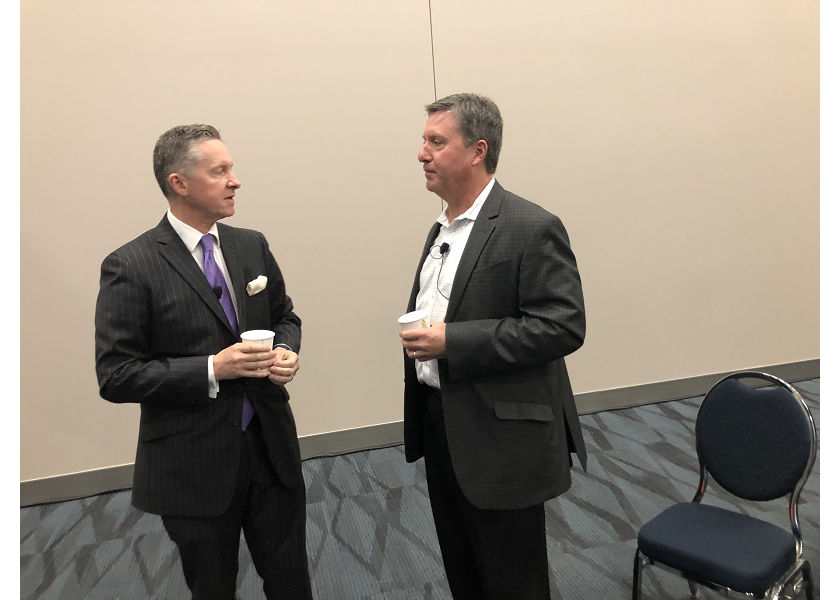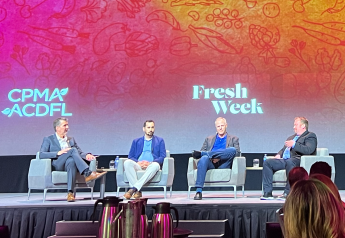Produce industry looks to Congress for solutions to the labor crisis

ANAHEIM, Calif. – As hard as it is to achieve, the bipartisan effort of Congress is the only way forward to meaningful farm labor reform.
That was the view shared by Dave Puglia, of Western Growers, and Kam Quarles, of the National Potato Council, at a Jan. 6 workshop at the 2022 Potato Expo.
Puglia, co-chair of the Specialty Crop Farm Bill Alliance and president and CEO of Western Growers, joined with Quarles, CEO at the National Potato Council, in a session looking at the prospects for a congressional solution to the U.S. ag labor crisis.
Quarles said executive actions by any administration won’t provide needed reforms to farm labor and the H-2A program.
“I think the reality of it is that, due to the structure of our ag labor and immigration system, looking to the administration through executive fiat to try to solve these problems is just not realistic,” Quarles said.
While executive orders and certain actions can change rules “around the edges,” Quarles said, meaningful immigration reform can only be delivered by Congress.
“The question for all of us is, how can we motivate Congress to deliver that solution?” he said.
Puglia said that providing legal status to existing farmworkers is important for Western Growers. At the same time, the expanded use of the H-2A guest worker program over the past 10 years has made that tool increasingly important, he said.
“I think that we're in a position now where both are equally important,” he said, and Puglia said the H-2A program will become even more important in coming years to the group’s member growers.
Providing legal status to existing workers is critical, but Puglia said the number of available domestic workers is declining over time.
As the farm workforce ages and retires, children of farmworkers are not coming in behind them, despite wages that top $20 per hour in some regions.
“Nobody is paying minimum wage,” Puglia said. “In fact, what we’ve seen in the last few years is a really little bit frightening; (there is) actually competition within the industry itself, to escalate wages at any given company and try and hold on to your good workers or poach from your counterparts.”
That, he said, was creating a wage escalation that is not sustainable for smaller and mid-size producers.
Quarles said the challenge now is getting to the proper number of votes in both the House and the Senate to deliver a solution that does not represent one extreme or the other. Most Americans are not raising their kids to work on farms as a career, so that means growers must have access to guest workers that can harvest labor-dependent fruits and vegetables in the U.S. or face a rising dependence on imported produce, he said.
Still, Puglia said the polarization of politics has made the middle ground of common-sense solutions such as the Farm Workforce Modernization Act dangerous places for politicians to go. The act provides a pathway for immigrant farmworkers who have worked in the U.S. for years to obtain legal status and an opportunity to earn U.S. citizenship.
However, the collapse of the Build Back Better legislation gives lawmakers a chance to reset. The $1.75 trillion legislation, which allocates $555 billion to fight climate change and $400 million for universal pre-kindergarten education, among other elements, was passed by the House but has stalled in the Senate.
“The conventional wisdom around most controversial issues, and certainly immigration is one of them, is you can't pass a bill in an election year,” Puglia said. “I've never bought that. It's simply a matter of finding the right people whose interests align at the right time.”
While Republicans have an aversion to passing something that would be characterized by some as amnesty, Puglia said, elected official also must consider changing demographics and the rising influence of Latin voters.
“(Politicians) know that demographics is destiny, and they may start rethinking their pain tolerance for passing (immigration reform),” he said. “I’m always an optimist, always trying to find the path forward, and I do think there is a path forward even in an election year.”
Quarles said advocates of immigration reform must work together to push a bill that passes both houses of Congress, so it can then be adjusted and improved in conference committee.
Most of agriculture supports the Farm Workforce Modernization Act, and Puglia said it is imperative that the sector is united behind immigration reform.
“It's our job as an industry and as advocates to remove as many excuses as possible from the people who have to cast votes on the floors of the House of Representatives and Senate to go the wrong way,” he said. “We want to remove as many excuses as possible.”
Even if Republicans gain ground in the mid-term elections, Puglia said any solution to farm immigration reform must be bipartisan in order to succeed.
“That's really hard; it means accepting stuff that you don't really like,” he said. “But the alternative is status quo, and that is spiraling around the drain.”







